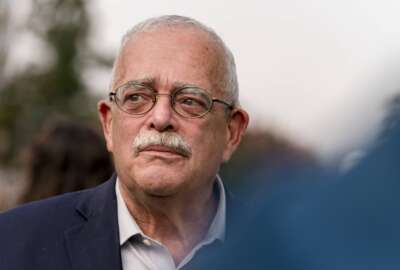
Congress continues to work on what amounts to an agenda for the lame duck session
The remaining days of the 117th Congress leave both chambers with a bit of an agenda. Perhaps topping the list for the Senate is keeping its record of passing...
Best listening experience is on Chrome, Firefox or Safari. Subscribe to Federal Drive’s daily audio interviews on Apple Podcasts or PodcastOne.
The remaining days of the 117th Congress leave both chambers with a bit of an agenda. Perhaps topping the list for the Senate is keeping its record of passing Defense authorization bills by the end of the calendar year. To get an update on all this, the Federal Drive with Tom Temin spoke with Bloomberg Government deputy news director Loren Duggan.
Interview transcript:
Tom Temin: And now the lame duck is paddling away.
Loren Duggan: That’s right, we had one week before Thanksgiving. And now we’re really at the the meaty part of the lame duck session, where they have a couple of key things they want to get done, probably a wish list beyond that of things they’d like to do, if they can get them done. And then obviously, they’ll, at some point, make calls on what they’re going to leave till next year. But this is going to be the interesting part of the year right now where there’s a big agenda, a lot of optimism of getting things done. And also, with the looming party change with the Republicans taking over the house next month in January, that’s going to be a big thing for Democrats to bear in mind if they decide what to get done and what to try to do in this part of the year.
Tom Temin: Now, there are 1000 amendments to that NDAA, and most of them are probably routine, but there’s always a little controversy. So that might not be a given. I guess it’s never a given, even though they have done it for 60 years.
Loren Duggan: Right, they have, and there seems to be momentum toward getting this done. And I’m not sure that we’re going to see much on the Senate version that was unveiled back in October. They took a break from their election recess to come and start debate formally on this bill, but really haven’t done anything with it since. And the idea has really been that the big four, or the four corners, as they’re known — the House and Senate Armed Services Chairman and Ranking Member — have been getting in a room and talking about what they want to do in the broad contours of that bill to try and get something done, to then present to both chambers at some point in December for votes and potentially pass that, get it to President Biden’s desk and call it a day on that important legislation. I think one of the key questions is what’s going to be in that bill from the defense side? And then the other is, what else do you put in there? Using it as a very important vehicle that members want to get done to push through other things, whether it’s Joe Manchin wanting his permitting legislation that there obviously will be some pushback on, and sundry other things that have been brought up in the two versions that have been unveiled so far.
Tom Temin: And they’re dealing with the Federal Highway Administration leadership; that has been authorized though, to start spending some of that infrastructure money.
Loren Duggan: That was part of the bipartisan infrastructure law that was signed back in 2021, with much fanfare, and we just celebrated the one year anniversary of that. And there’s been some hearings on Capitol Hill looking at how to dole out that money and how that will work with the states. One key question, though, is who’s in charge of the Federal Highway Administration? And the Senate Environment and Public Works Committee this week will be holding a vote or scheduled at least to hold a vote on that nomination, try to get that through. It’s an important position — billions of dollars being doled out to the states for different transportation projects. So certainly, the implementation of that law is ongoing, but will be a focus going forward, because some of that money is due to be spent, even without further appropriations action, although every appropriations law is a chance to do something more or to adjust the funding that has been provided.
Tom Temin: And thanks to the latest Ponzi, Madoff type of scheme with the failure of that FTX outfit, and bitcoin and cryptocurrency, that’s given the Agriculture Committee in the Senate some work now.
Loren Duggan: Absolutely. They’re holding a hearing this week on the FTX failure and everything that went into that. Agriculture committees do have some oversight of commodities in the Commodities Futures Trading Commission. And so therefore, they have a stake in this. This is just going to be the tip of the iceberg on these hearings, though, both this year under Democrats in the House and the Senate. And then I think going into next year as well; Republicans when they take over the Financial Services Committee will be looking into this as well. I think this will be an ongoing area of oversight among regulators too. This is some brave new world territory when it comes to Bitcoin and cryptocurrency that they’ve been trying to figure out how to wrap their arms around. And a number of regulators could have a piece of this, just given how intertwined this is with various aspects of the economy and the financial system.
Tom Temin: But this will definitely push the agenda on regulation of that. The question is, what is it? Is it a commodity? Is it a security? And is it a financial-purely instrument? I mean, it’s nothing but a piece of encrypted software that somebody says, Okay, I think it’s worth $10,000, you think it’s worth $12,000? They’ve got to figure that out, don’t they?
Loren Duggan: On some level, yes. But there’s also security laws about what you can say to potential investors, and there’s always the FTC looking into it. Fraud is fraud, whatever might be underpinning it. So if there are fraudulent activities going on, that’s where they would get a piece of it as well, potentially. So a number of agencies, a number of questions there, and broad interest in Congress, with, as I say, both parties going to want to have a piece of this and look into it as well.
Tom Temin: We’re speaking with Loren Duggan, deputy news director of Bloomberg Government. And then of course, there is the December 16 expiration of government funding and I think, what is it, Wednesday is December, the start of December? So we are into that glideslope.
Loren Duggan: That’s right. That’s the other big package that Congress has to deal with in the lame duck session. They have been working overtime on this, but still never got that top line agreement that would give direction to the subcommittees on how to reach and write their bills. But I think that’s going to be a major focus once they’re back into town: trying to come up with some sort of agreement there. There are retiring chairmen and ranking members in the Senate side, with Richard Shelby and Patrick Leahy both retiring; they won’t be here, they’d like to clear the decks for their successors, try to get something done on that before the end of the year. If they needed more time, obviously, another continuing resolution is an option to give themselves a week if they needed that to finalize negotiations and then write and vote on that bill and get it to the President. But that will be another attractive package for other provisions that can’t go on their own, don’t make it into NDAA. Or will buy support for this package, which is going to need bipartisan support in the Senate to get over that 60 vote threshold that applies to most legislation. So that’s going to be a major focus of the next several weeks trying to fund the government. There has been pressure in the past from some House Republicans to maybe kick the can into next year when they will have one of the two chambers and have more leverage. We’ll have to see if that is an argument that’s listened to, or if they try to get it wrapped up and done.
Tom Temin: And on House new leadership, when will that vote take place? And from everything we’ve heard, it might be a little bit too early yet for Kevin McCarthy to do the proverbial drapes measuring.
Loren Duggan: So we’re kind of in between. The House Republicans had their internal vote for their leadership and nominated Kevin McCarthy to be speaker, which that vote will take place early next year on the House floor. And he has to have a majority of the members who vote at that time. So there will be question marks until that January vote over as to whether he can really get over the line. This week, we’re going to see the Democratic Caucus in the House convene to choose new leaders for the first time in quite a while. Generational change is perhaps overused. But in this case, it’s real, because Nancy Pelosi, Steny Hoyer, very familiar faces have said they won’t be leaders in the next Congress. So we’re looking at a new crop there with Hakeem Jeffries, Katherine Clark and Pete Aguilar likely to get those top three slots and lead the Democrats next year. So those organizational matters will continue the vote on internal rules and get ready for that all-important January start of the new Congress.
Tom Temin: And if you look at everybody on both sides, House and Senate, Republican and Democrat that are leaving, that’s really centuries of experience walking out the doors.
Loren Duggan: Yeah, Patrick Leahy has been around since the 70s. That’s a long time and there aren’t a lot of members who have experience going back that far. So some expertise out the door and new blood coming, in constant change in the Congress. That’s the part of covering it that makes it interesting.
Copyright © 2025 Federal News Network. All rights reserved. This website is not intended for users located within the European Economic Area.
Tom Temin is host of the Federal Drive and has been providing insight on federal technology and management issues for more than 30 years.
Follow @tteminWFED





